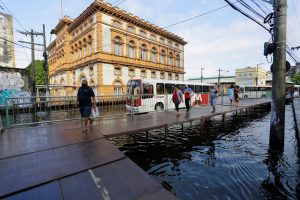If you are following the latest developments in climate action, you might know that at the end of July the Dominican Republic hosted the UNFCCC Latin America and the Caribbean Climate Week (LACCW).

People walk through a footbridge set up above a flooded street in downtown Manaus, Brazil after heavy rains in May 2021. Photo credit: Shutterstock
Regional events like this are designed to build momentum and foster multisectoral collaboration for climate action at the regional level. Three main topics were selected to guide this LACCW, reflecting the concerns of a region greatly impacted by the climate crisis:
- Resilience against climate risks;
- Transition to a low-emission economy;
- and partnerships to solve pressing challenges.
The LACCW brought together more than 1,700 people from different countries and sectors and delivered a clear message about the need to take immediate action and increase the ambition of current climate commitments.
While all guiding topics of the LACCW are trending in philanthropy, the programme did not include any mention of the philanthropic sector[1]. Finance, unsurprisingly, appeared 71 times, as a historical challenge for climate negotiations has been ensuring that climate finance works to accelerate the climate transition and deliver climate justice. However, a key to effectively addressing this challenge may lie in connecting philanthropic mechanisms, learnings, and expertise with climate finance structures.
Climate finance, understood as the different sources of financing to support mitigation and adaptation actions, has failed to deliver systemic change. The annual $100 billion climate finance target that high-income nations promised to lower-income countries in 2009 failed to be met by 2020, and climate finance mobilized remained significantly beyond the target. Furthermore, the vast majority of the funds that were ultimately delivered in 2020 (71 per cent) consisted of loans (OECD, 2021)[2]. But even more concerning is that climate finance is generally not reaching those who need it most. According to another study, less than 10 per cent of international climate finance funds reach the local level (in 2016, according to IEED, 2017)[3].
Time is running and the moment to care for the planet our children will inherit is now.
Funds reaching the local level are a matter of justice and reparation, but are also fundamental to solving the crisis because it is at a local level that action and innovation take shape. As Max Puig, Executive Vice President of the National Council on Climate Change of the Dominican Republic said at the closure of the LACCW[4]: ‘Much has already been agreed and set out in written agreements, and in view of the commitment we have with the Egyptian presidency of COP27, it is time to act.’
Philanthropy can be a valuable ally in accelerating action, especially by unlocking funds to mobilise solutions at the local level. The role philanthropy can play is at least three-fold:
- Make funds available and accessible for local communities to act on climate now;
- Foster learning about climate impacts by local communities and facilitate knowledge-based action;
- Promote a systems-change approach to support and scale deployment of global climate finance to local level.
Fundación Avina, a Latin American philanthropic organization, shares the LACCW spirit of solutions and cooperation. We have been promoting collaboration to solve the climate crisis for over a decade through a portfolio that tackles biome conservation, access to water, resilient cities, technological innovations, and climate policy, among others. Towards COP27, we are focusing our efforts on partnerships that can deliver three roles aforementioned and unlock climate finance for the local level. This, we believe, can promote and speed up innovation and make the promise of solutions to the climate crisis a reality.
To address these issues, Avina is calling for partners interested in Building Approaches to fund local Solutions with climate Evidence (BASE). Under a task force and action-driven spirit, the initiative BASE will gather stakeholders, alliances, and networks to proactively address the challenge of funding for locally driven climate solutions while promoting simplicity and speed. Our work will combine direct funding to local level and learning, aiming to serve as a ‘proof of concept’ on ways to spark local solutions and deliver the spirit of climate action now.
Time is running and the moment to care for the planet our children will inherit is now. Join us to scale and speed up the climate finance for local solutions.
Paula Ellinger da Fonseca is the Director for Climate Action at Fundación Avina and co-chair of the EPRG to Race to Zero. Andres Mogro is the Coordinator Climate Programme at Fundación Avina. Victoria Matusevich is the Coordinator of BASE at Fundación Avina.








Comments (1)
This is laudable, but can it cover waste Management activities especially in Africa?